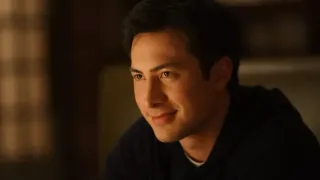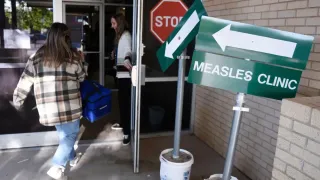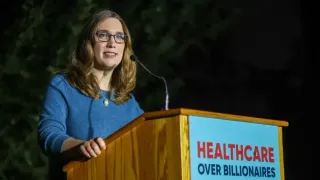December 9, 2018
LGBT Seniors Grapple with End-of-Life Issues
Matthew S. Bajko READ TIME: 5 MIN.
While enjoying her eighth decade on the planet, Donna Personna knows her remaining days are numbered. Yet the prospect of her demise doesn't scare her.
"The end question. 'The end.' It's not a touchy subject for me. I'm irreverent," said Personna, a transgender woman who grew up in San Jose and now lives in San Francisco. "I have been on the planet for 72 years. I learned long ago this was going to come."
Personna, a beloved drag performer, playwright, and hairdresser, credits her Mexican heritage with teaching her that death is a part of life. She pointed to the annual Dia de los Muertos holiday – the Day of the Dead in early November – as one example of how, from an early age, she was taught to embrace one's mortality rather than fear it.
"I am not worried about it. It doesn't scare me," said Personna, who graduated with honors from San Jose State University and, for years, owned her own hair salon in Cupertino, which she sold a while back but continues to cut hair at once a month for longtime clients.
Born into a large Baptist family with 16 siblings, Personna remains close with several of her older brothers and their families in the Bay Area. She is confident she can rely on them in the case of emergencies or if her health deteriorates.
"Some of my nieces said, 'You can live with us,'" said Personna, who has designated one of them the beneficiary of her estate.
Her Plan B, however, is to move into a pueblo outside Guadalupe, Mexico where her Social Security check and personal savings will be worth more.
"I want to spend the rest of my days in Mexico. I don't want to die in San Francisco," said Personna. "I am longing to go there."
Confronting the end of one's life isn't easy for the majority of seniors, whether LGBT or straight. Most have not declared an executor for their estate, let alone discussed with their physician what sort of care they want in their dying days.
"It is rooted in the death phobia that North American culture has," said Brian de Vries, a gay man and professor emeritus of gerontology at San Francisco State University who is a leading expert on end-of-life issues among LGBT seniors.
There are an estimated 2.7 million Americans who are LGBT and 50 years of age or older. Of that age group, 1.1 million are 65 and older. By 2060 LGBT elders in the U.S. are expected to number more than 5 million.
This generation of LGBT seniors differs from its heterosexual counterpart in significant ways, according to aging experts. Most of the LGBT seniors experienced discrimination not only in their day-to-day lives but also in medical settings due to their sexual orientation or gender identity.
LGBT seniors are oftentimes no longer in touch with their birth families, having been ostracized after they came out of the closet. And many don't have a partner, spouse, or children of their own to rely on as they age.
"The issues around aging alone are particularly meaningful in LGBT seniors," said Lisa Krinsky, 55, a lesbian who is the director of the LGBT Aging Project at the Fenway Institute in Boston.
And in the case of many older gay men, they lost their families of choice, whether it was their friends, partners, or spouses, to the AIDS epidemic. Thus, they are more likely to be aging alone. And if they are living with HIV, they are largely unprepared for their retirement years having believed they would have died by now.
Dearth of research
For LGBT seniors, living alone "sets them up to more likely need institutional care as one gets older," said Daniel Stewart, a doctoral student and adjunct professor at Saint Louis University in Missouri.
Stewart and his colleague, Brandy Fox, a Ph.D. student at the university's Center for Health Care Ethics, presented their research on LGBT older adults' end-of-life perceptions and preparations at the Gerontological Society of America's annual conference, held last month in Boston.
"There is not a lot of research on LGBT end of life," noted Stewart.
Talking about the end of one's life can be exceedingly difficult for LGBT seniors, according to aging experts, because of their lack of trust in their health care providers or not having close familial or social connections, leaving them without a family member or friend they can turn to and discuss how they want to be cared for as they age.
"We know gay and lesbian seniors delay getting care," said Kysa M. Christie, Ph.D., a clinical psychologist at the Veterans Affairs Boston Healthcare System during a panel at the aging conference focused on palliative and end-of-life care for LGBT older adults.
The reasons can vary, said Christie, from internalized homophobia and heterocentrism to stress-related stigma and poverty. It is estimated that one in five LGBT seniors, she said, "have no one to call in a crisis. Compare that to one in 50 for heterosexual seniors, so that is a stark difference."
Fox and Stewart interviewed 17 LGBT seniors living in the Midwest about end-of-life issues. The cohort expressed concerns about being a burden as they aged and largely had unfavorable views of health care settings, particularly religious affiliated hospitals.
As one 78-year-old woman told the researchers, "Me and the medical profession do not get along," recalled Fox.
De Vries and his colleagues in the field of LGBT aging call the lack of discussions about one's palliative care needs, from who will be one's power of attorney to what a person's advance directives are for their medical care, "the missing conversations." It is a subject that seniors must repeatedly address as their circumstances and choices may change as they age.
"I like that it is plural, as once you have the conversation people think you are done with it," said de Vries. "It is hard enough to have the conversation. And once you have it, you want to wipe your hands dry and move on. As if that is it; it is one of many conversations people need to have, I think."
For several years now de Vries has been involved in research in Canada looking at end-of-life issues among LGBT seniors. In one paper de Vries co-wrote, and is under review at the International Journal of Aging and Human Development for inclusion in a special issue on LGBT aging, he and his colleagues note that evading end-of-life discussions "keeps death 'in the closet' – along with one's hopes, fears, and wishes about their end of life."
The issue struck close to home for de Vries six years ago when his husband, John Blando, Ph.D., who is also a professor emeritus at SF State having worked there as an instructor/adviser in the Department of Counseling, was diagnosed with Parkinson's disease. The men, both 62 and together 33 years, began to seriously discuss end-of-life issues, such as how to care for each other, as they drew up their wills and estates. When they moved four years ago from San Francisco to Palm Springs and had to revise their wills, they also completed their advance health care directives and durable powers of attorney.
"These naturally involve deeper discussions about end of life – at least that was our experience," said de Vries. "Of course, elements of end-of-life discussions have dotted our other conversations as we talk about our plans and hopes for the future. I will admit to some discomfort in some of these conversations – about raising issues that we both fear, about releasing strong emotions – but they ultimately rest on expressions of love and opportunities to share."






